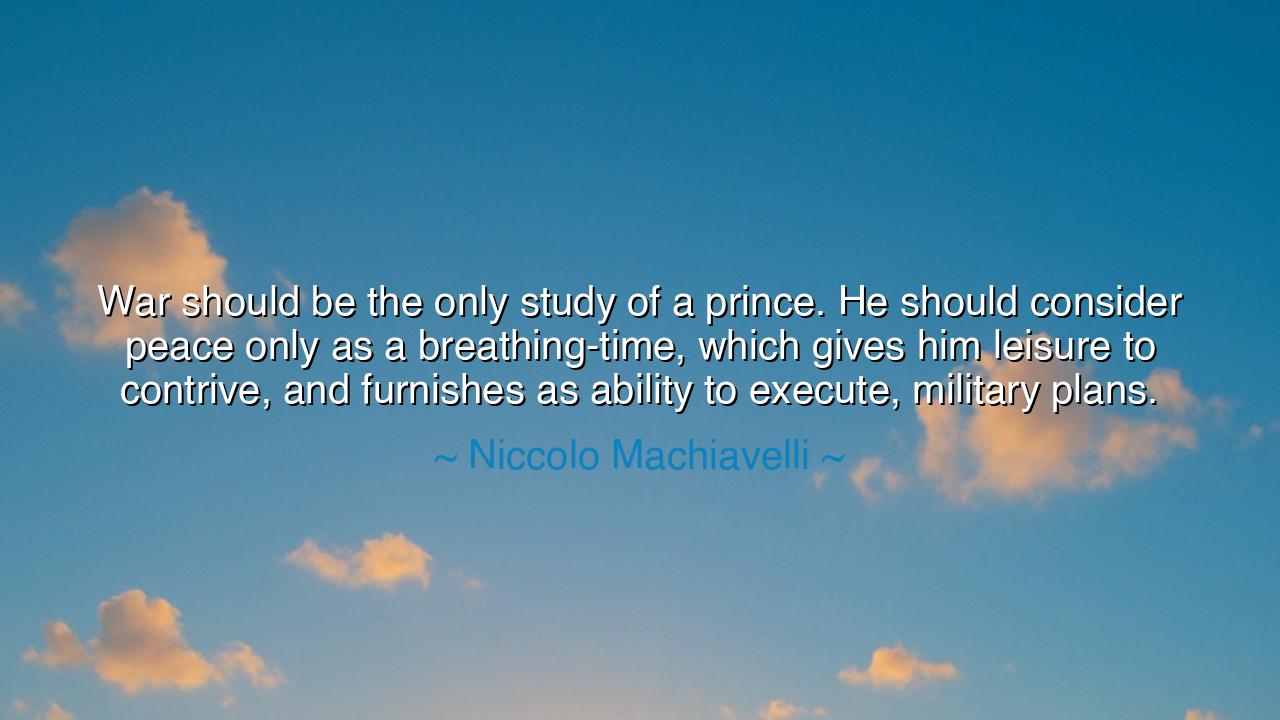
War should be the only study of a prince. He should consider
War should be the only study of a prince. He should consider peace only as a breathing-time, which gives him leisure to contrive, and furnishes as ability to execute, military plans.






Niccolò Machiavelli, that stern observer of princes and states, once declared: “War should be the only study of a prince. He should consider peace only as a breathing-time, which gives him leisure to contrive, and furnishes as ability to execute, military plans.” These words, severe and unflinching, reveal the heart of Machiavelli’s teaching: that the security of a state rests not on idle dreams of harmony, but upon vigilance, strength, and readiness for strife. To him, the art of war was not one pursuit among many, but the very foundation upon which a ruler’s power and a nation’s survival depended.
When Machiavelli says that war should be the only study, he speaks not to glorify bloodshed, but to warn against the folly of complacency. For in his age, Italy was torn between powerful neighbors and internal factions. He saw how princes who neglected arms soon lost their thrones, how cities unprepared for conflict were consumed by stronger foes. Thus, he counseled that a wise ruler must ever sharpen his sword, even in times of peace, lest he find himself disarmed when danger arises. In this, he echoes the timeless wisdom: the price of safety is eternal vigilance.
Peace, in Machiavelli’s vision, is not the end of war but the interval between campaigns, a time of preparation rather than indulgence. He calls it a breathing-time, a pause not for idleness but for training, planning, and strengthening the sinews of the state. For peace without preparation is but a false calm before the storm. The ruler who sees peace as permanent invites ruin, but the ruler who treats peace as preparation secures his people against the inevitable return of conflict.
History offers us many examples. Consider Alexander the Great, who from his youth was trained in the arts of war under the eye of Aristotle and his father Philip of Macedon. Even when no battles loomed, he studied maps, drilled his armies, and cultivated discipline. Thus, when the time came, he was ready to sweep across the Persian Empire with unmatched swiftness. His empire, though brief, bore witness to the truth of Machiavelli’s words: that mastery of war secures dominion.
On the other hand, reflect upon the decline of the Roman Empire. In its early days, Rome flourished because its citizens were ever prepared for war; its armies were disciplined, its generals vigilant. But as luxury and ease grew, as the people lost their martial spirit, Rome became vulnerable to the barbarian tribes. The emperors who forgot that war was their chief study saw their borders crumble. Thus, Rome itself is both a testament to the power of military vigilance and a warning against its neglect.
Yet Machiavelli’s words, though harsh, hold wisdom beyond the battlefield. For what he calls war, we may understand as the discipline of life itself—the readiness to face struggle, hardship, and challenge. Peace, whether in the realm of nations or the soul, should never lull us into weakness. It should be a time to sharpen our skills, to strengthen our character, to prepare ourselves for the trials that will surely return. To live as though peace will last forever is to live in illusion; to prepare in peace for struggle is to live in wisdom.
The lesson, therefore, is this: whether ruler or commoner, live not in idleness but in readiness. Use your seasons of peace to learn, to train, to cultivate strength of body and spirit. Treat comfort not as an end, but as a means of renewal for the battles to come—whether they be battles of the sword, the will, or the heart. Let every peace be a preparation, and every preparation a foundation for victory.
So, O listener, heed Machiavelli’s counsel: study war—not to glorify destruction, but to master the discipline of survival and strength. Let your peace be breathing-time, not for slumber, but for sharpening. For when struggle comes, as it always does, those who have prepared shall stand unshaken, while those who dreamed idly of endless peace shall be swept away. In this truth lies the stern wisdom of the ancients, a teaching that endures as long as men and nations contend for their place in the world.






AAdministratorAdministrator
Welcome, honored guests. Please leave a comment, we will respond soon